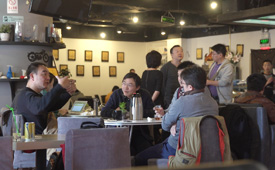|
 |
 |
|
NOT AN ATTIC: Garage Cafe, a business hub nearby Zhongguancun Hi-tech Zone (YUAN YUAN) |
OPEN OFFICE: People in discussion at Garage Cafe (YUAN YUAN) |
A cafe in Beijing's hi-tech zone has become more than a place to get a quick buzz or an open wireless hotspot. Now it's the buzz of investors and entrepreneurs and a warm place for incubating startups.
With a name like Garage Cafe, one might expect a ground-level operation, but it is actually located on the second floor of a shabby hotel at the edge of the northwestern corner of Beijing's Fourth Ring Road in Haidian District. Where people used to swarm to the Haidian Book Market complex to buy reference books for examinations before the days of online bookstores, prospective hi-tech entrepreneurs are trickling in.
Why? Because a $3.50 cup of coffee is a small price to pay in lieu of office space and Internet access in neighboring Zhongguancun Hi-tech Zone, a high-rent area known as China's Silicon Valley.
When Su Di decided to open the cafe, he intentionally chose the quiet book market as the location. "Even though it is the neighbor of the hi-tech area, the rent here is just half price," Su said. "And our target market is totally different from those in regular cafes."
And with customers like presidents of HSBC Holdings, McKinsey & Company and MetLife as well as the mayor of Beijing and U.S. ambassador to China, this is no mere boast. Su's clients are banking on prospective investors eavesdropping on their conversations.
Idea incubator
For Su, his cafe is not only a place people can just drop in for a cup of joe. Having previously worked as investment director of ChinaCache, a Chinese content delivery and cloud computing service provider, opening a cafe where startups and investors could hook up was just a random idea Su came up with while stuck in traffic.
He didn't take it seriously at the beginning but his friends, after hearing this idea, thought it might be feasible, so he decided to give it a shot.
"I started it for fun and was ready to lose money," Su said. "I wanted this cafe to be a utopia for business startups and it seems no utopia can make money."
Su and his friends named it Garage Cafe, noting that Apple, Hewlett-Packard and Harley-Davidson all started in garages. Rent is an eminently important detail for throngs of Chinese entrepreneurs in uptown Beijing. "We wanted it to be an open office for business start-ups and they can team up and stay here at very low cost," Su said.
Nonetheless, the cafe's first month of business in April 2011 worried Su. Only three startup business teams showed up, and the coffee they bought couldn't even cover 10 percent of the cafe's 100,000-yuan ($16,150) monthly rent.
The turning point came when Mo Xiaoxi, one of that first batch of customers, found his first investor with Su's help. Mo lived in a suburb 30 km away but commuted to the cafe every day during its first month to discuss a Web project with his two partners. "I decided to try for three months, and if we didn't succeed, I'd go back to my hometown," said Mo, who only had 30,000 yuan ($4,845) to start.
Su saw the perseverance and hardworking spirit of the young business starters, and persuaded his friend Lin Xinhe, an investment manager from 58.com, a Beijing-based classified advertising site, to cut them a deal. Before they knew it, Mo's company had another 150,000-yuan ($24,255) investment.
Entrepreneurs began to pour into Garage Cafe upon hearing the story, hoping to seize similar opportunities to find investors. "I talked to everybody that came into this cafe to see what they wanted," said Su, who enjoyed listening to people's various stories as well as the increased business. Well-known angel investors Xue Manzi and Cai Wensheng became regular customers and hyped the cafe in their microblogs.
In December 2011, the Zhongguancun Haidian Science Park's Administrative Committee called Garage Cafe an "innovative incubator" and simplified registration procedures for some of its hosted startups. For Su, it was a great honor for his fledgling business, which enjoyed profitability in only its second year thanks to clever merchandising. The Garage Cafe brand was born.
| 